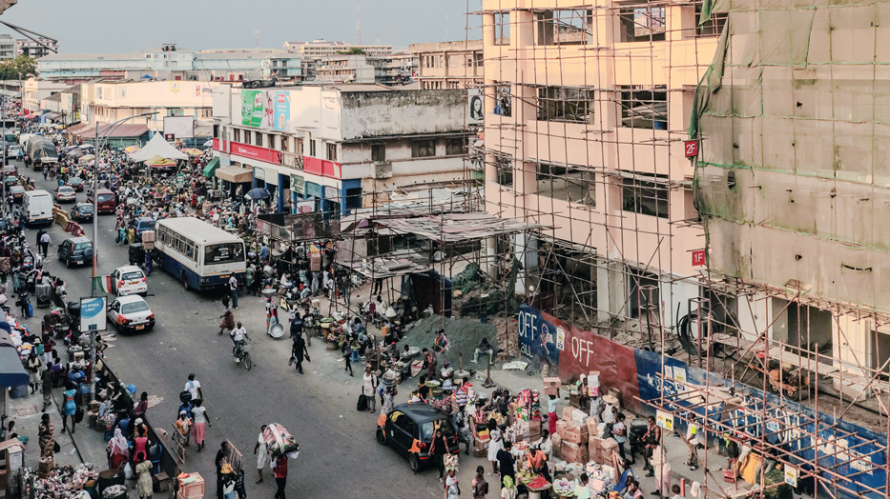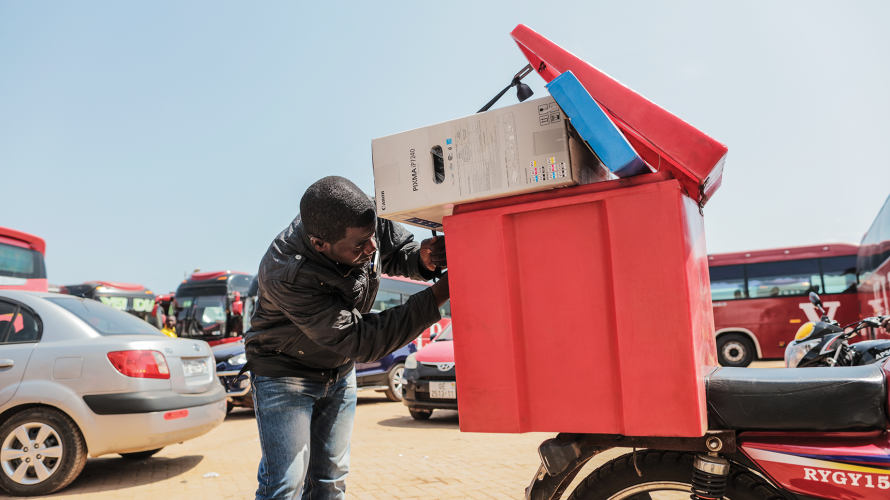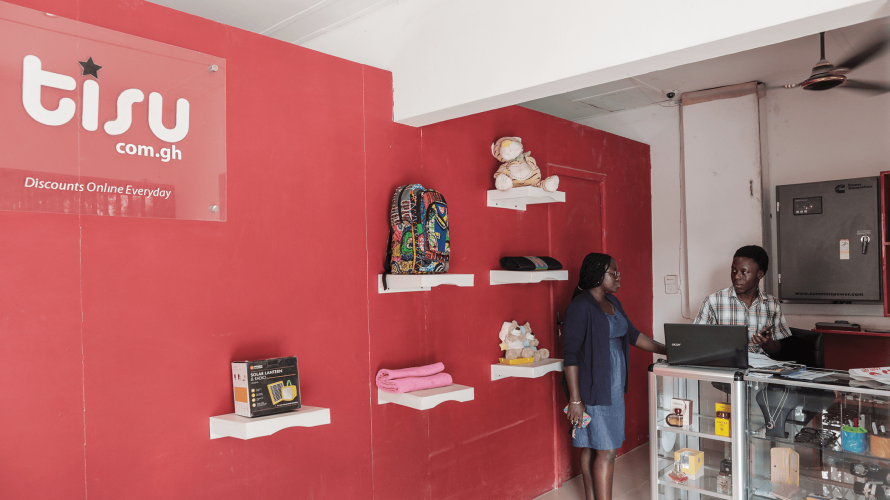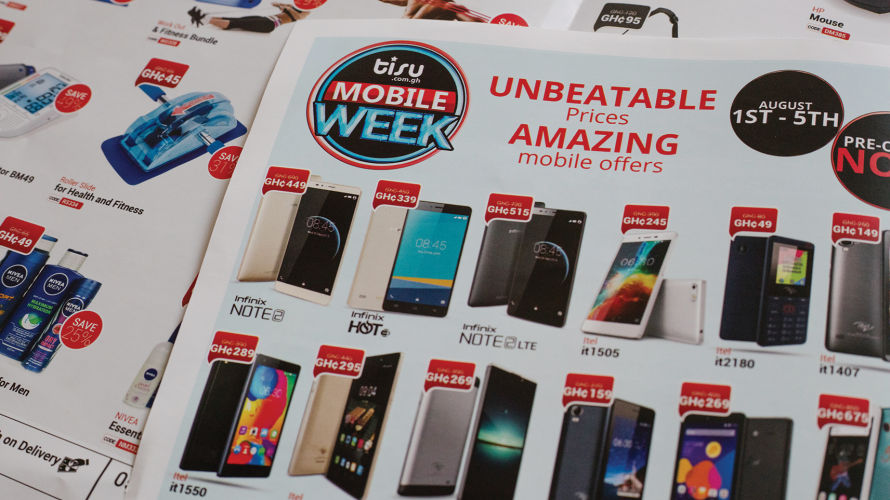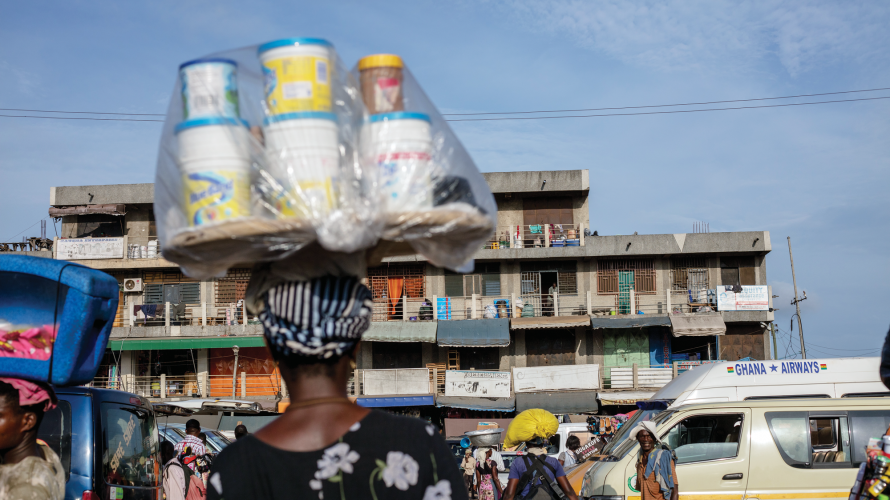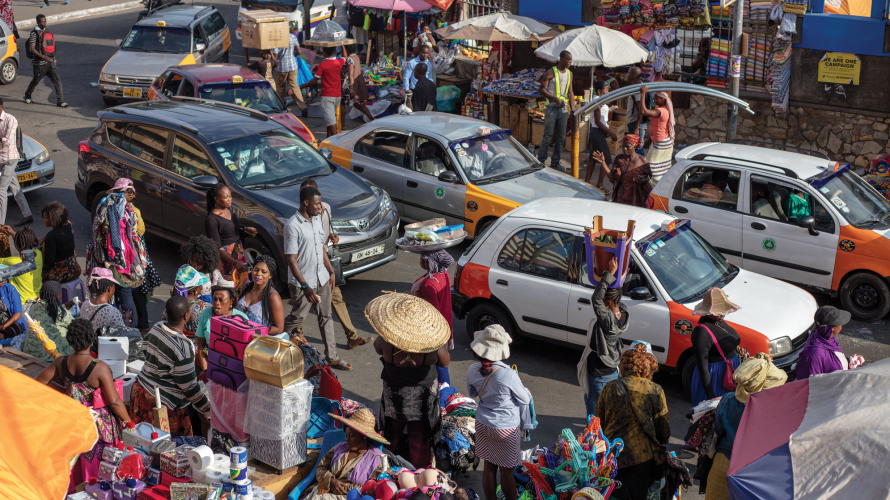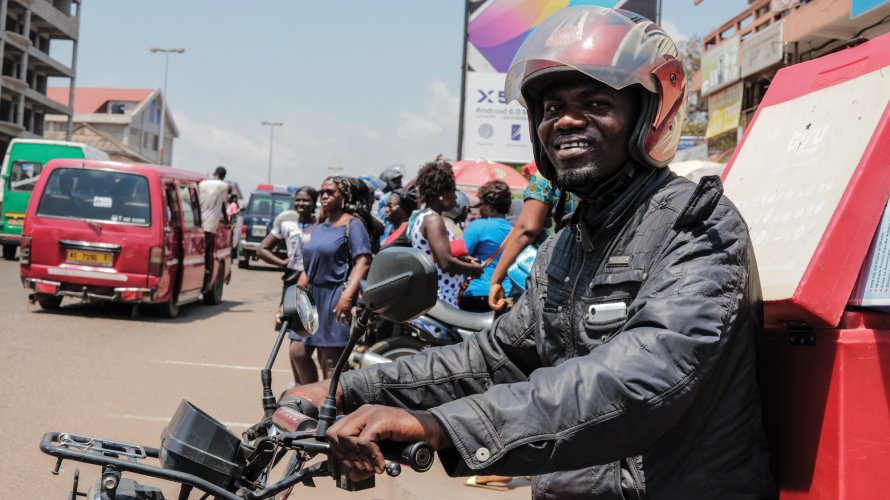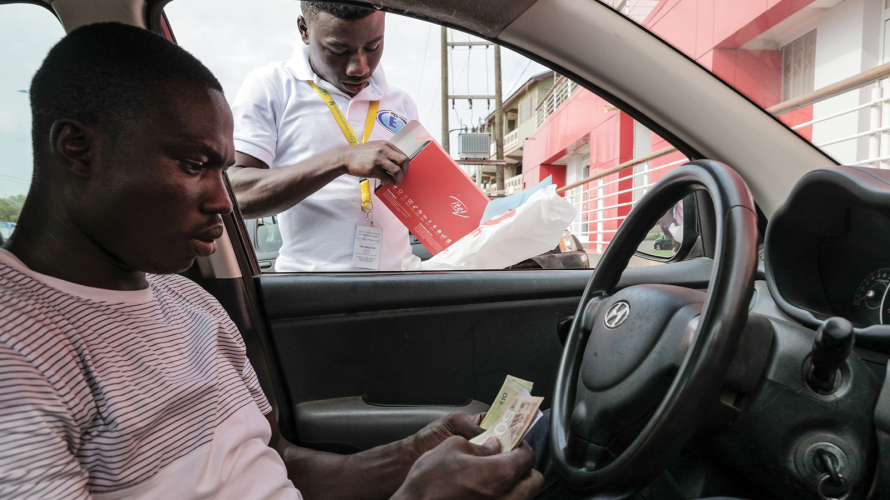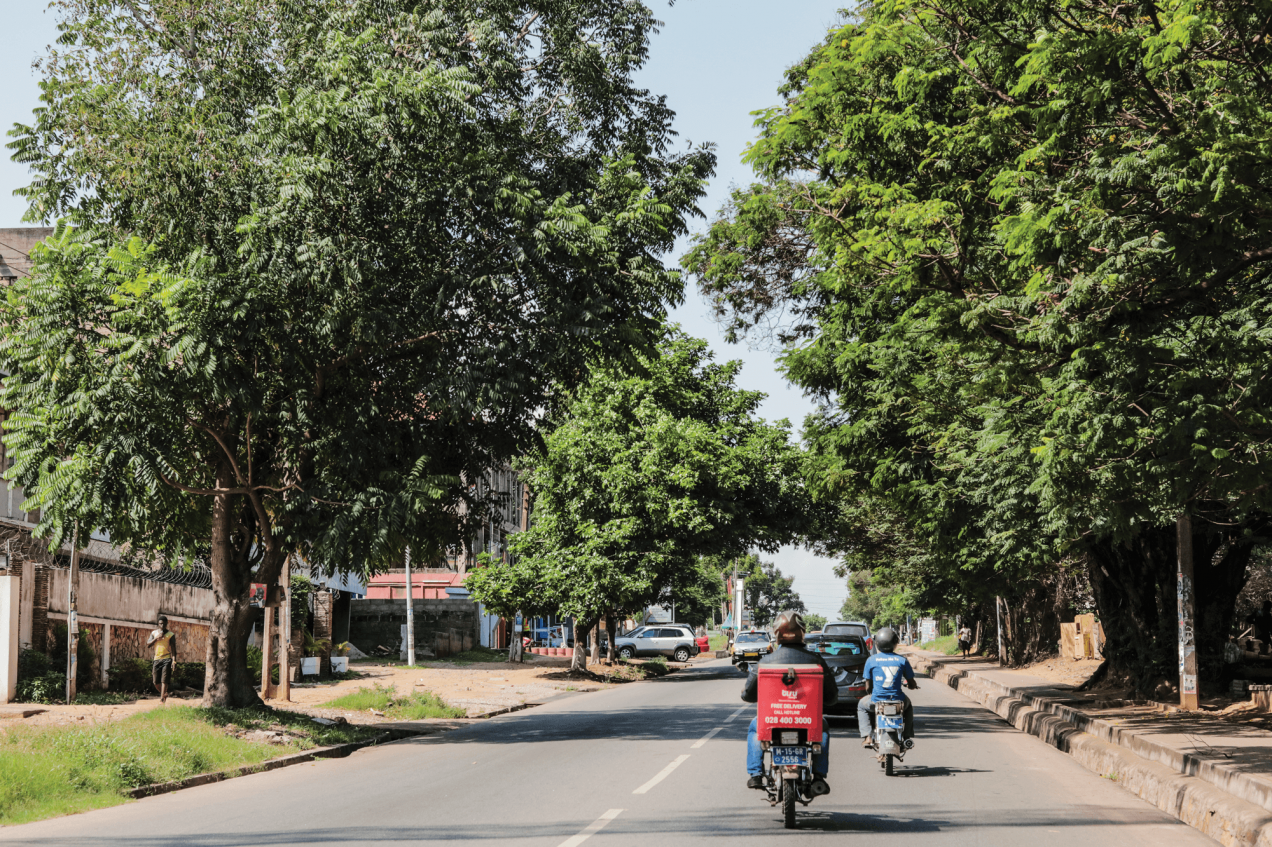

Business Impact
Ghana’s Last Mile
Innovative African e-tailers are offering sought-after goods to the continent’s growing middle class. But logistical challenges must be worked out delivery by delivery.
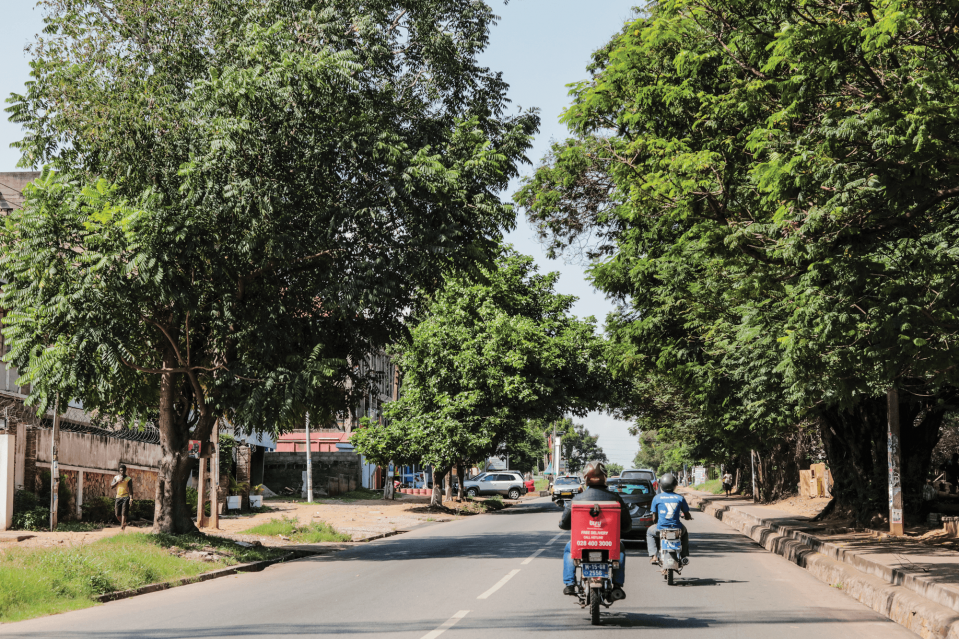
It’s the peak of the afternoon in Accra, the capital of Ghana, and Michael Ashong is growing restless. A delivery driver for Tisu, a local online merchant, he’s spent much of the day in a compact black Hyundai hatchback delivering shoes, smartphones, and other consumer items across the city, with me riding along. Now Ashong’s final delivery is proving difficult. Like most drivers in the city, he navigates by landmarks: Accra’s streets are generally well marked, but few buildings have numbers, and most people here don’t use the official address system. Ashong’s last customer, a student at a nursing school on the city’s outskirts, hasn’t been able to guide him from the sights he shouts into his phone: the main gate of a hospital affiliated with the school; a row of derelict buildings; “the place where they sell yams.” At one point Ashong flags down a passerby, who speaks to the customer on his phone, but the resulting directions only lead him further off track. After 30 minutes of driving in circles, Ashong and his customer finally agree on an alternative meeting spot, and the customer arrives to pay cash for his package. In the end, the delivery, including round-trip travel, takes nearly two hours, all for a “Moon Love” necklace costing 49 Ghanaian cedi ($12).
“These are the challenges we get to,” Ashong tells me as we return, windows down in the tropical heat, to Tisu’s logistical hub and office in the suburb of East Legon, northeast of the city center. “At least the customer was [answering his phone]. Sometimes you get there and his phone is off. I normally try three times and then I have to move.”
Ashong, a soft-spoken 28-year-old who trained as a mechanic and used to drive a taxi before coming to work for Tisu, is the navigator of his employer’s last mile, the final link in a supply chain that starts with manufacturers around the world, traverses sea and land to the shelves of Accra vendors, and finally arrives at Tisu’s hub. There high-volume items are kept in stock, others are collected on order, and all are eventually parceled out to one of the five drivers the company employs directly.
Shopping online is still a novelty in Ghana, as it is in much of Africa: fewer than 1 percent of African retail sales are made online. Yet rising purchasing power across much of the continent, buttressed by years of strong economic growth, has boosted demand for Western consumer goods faster than Africa’s limited brick-and-mortar retailers can supply them, especially since traffic congestion in many cities makes trips to the mall untenable. Meanwhile, smartphones and access to high-speed Internet are increasingly common. All this means African e-commerce has started to grow. Earlier this year, the sector reached a watershed moment when Jumia Group, formerly Africa Internet Group (see 50 Smartest Companies 2016), the parent company of Africa’s largest e-retailer, Jumia.com, became the continent’s first tech “unicorn,” surpassing $1 billion in market value. Like much of Africa’s online economy, Jumia has gotten its funding primarily from large international corporations, among them French insurer Axa, Wall Street leviathan Goldman Sachs, German technology investor Rocket Internet, and South Africa’s top telecommunications company, MTN Group.
All these companies are betting that growth in Africa’s online economy will accelerate. McKinsey, the global consultancy, predicts that in the continent’s largest economies, 10 percent of retail sales could be transacted online by 2025. That’s greater than the proportion in the United States today and would translate to $75 billion in sales a year. “In the long term, there’s no question that e-commerce is going to be massive in Africa,” says Jørn Lyseggen, founder and chairman of the Meltwater Entrepreneurial School of Technology, an Accra-based incubator of technology startups.
But getting there will require companies to overcome many problems like the ones I saw Ashong facing.
His employer, a Groupon-style deals site owned by the Swiss–South African venture Ringier Africa Deals Group, has grown steadily since its launch in 2011 and now draws 250,000 visitors per month. Its focus is mainly fashion, home décor, and electronics.
Its greatest competition comes from Ghana’s traditional marketplaces. Downtown Accra’s sprawling Makola Market, far from Tisu’s quiet suburban hub, contains everything from Chinese-sourced wigs and plastic kitchenware to live crabs and local kente fabrics—sold from sidewalks, partially covered stalls, or the tops of women’s heads. Hawkers cluster at intersections selling sunglasses, earbud headphones, and coconuts out of pushcarts. Tin-roofed shops displaying sneakers, dress shirts, sofas, and the occasional parrot cling to the edges of highways and tree-lined boulevards.
For many Ghanaians, though, a lack of trust in online retail remains a significant deterrent. The vast majority of Tisu customers pay with cash on delivery, in part because few of them have a credit card or mobile money app, but also because most Ghanaians prefer to have a product in their hands before they commit to buying it. Augusta Davis, head of operations and customer service for Tisu, says the company has had problems with customers placing orders simply to “test the site,” only to refuse the products on delivery.
Internet penetration in Ghana is relatively high—the National Communications Authority counts 18 million mobile data subscribers, equivalent to 66 percent of the population—but data bundles are expensive and memory is limited on many popular phones, deterring some from downloading apps for making purchases. To overcome that challenge, Tisu produces a print catalogue that it leaves at restaurants, salons, and other strategic points around the capital. Jumia goes a step further, employing a network of commissioned sales agents, called J-Force, to place orders for clients who have limited online access or are not comfortable ordering themselves. “J-Force gives a human touch to what we do,” says Francis Agbemey, who manages the network in Ghana.
Over four hours, Tisu driver Michael Ashong zigzags across the Ghanaian capital and its suburbs, dealing with traffic jams, poor directions, and hard-to-reach customers, delivering items costing less than $10 and more than $100. On busy days, it’s not unusual for Ashong to make 20 stops, delivering orders to customers and picking up goods from third-party sellers.
Stop 1
Item: Nike Presto Flyknit sneakers & Monster Bluetooth stereo device.
Time: 10:40 a.m.
Stop 2
Item: Infinix Hot 4 smartphone
Time: 11 a.m.
Stop 3
Item: Detox Bottle
Time: 11:40 a.m.
Stop 4
Item: Infinix Hot S smartphone
Time: 12:05 p.m.
Stop 5
Item: Moon Love necklace
Time: 1:55 p.m.
Arguably the biggest barrier to online retailing—bigger even than cultural norms or limits on connectivity—is the one Ashong faces daily: the challenge of delivery. In Accra, where the bulk of the country’s affluent citizens are concentrated and where the lion’s share of Tisu’s orders come from, traffic is so bad that e-retailers make most of their deliveries on motorbikes, which can more easily maneuver through congestion. Ashong, Tisu’s only driver on four wheels, says he saves time by making use of the city’s “short ways” and “corners”—deviating from the well-maintained primary routes onto back roads that are unpaved or full of potholes.
The day I ride with Ashong, he drives for four hours through quiet suburbs, office parks, and hectic downtown streets, but he manages just five deliveries and two pickups from third-party vendors. (On busy days, he says, the total can rise to 20.) Ashong tracks down every customer, and all accept their products. Even the day’s final client—the nursing student, Samuel Akuffo, who’s had to leave a quiz to come and find us—is forgiving of the hassle required to get the necklace.
“My girlfriend’s birthday is on Saturday,” he explains. The gift was his first Tisu transaction, made on his smartphone via the company’s Android app. “I looked at the deals and it was cool.”
Ashong then offers Akuffo a ride back to his classroom, and he sighs as our new passenger directs him onto a dirt road we’d missed before, not far from the yam seller. We arrive, and Akuffo rushes to rejoin his class. “Next time,” he tells Ashong, “you’ll know where to find me.”
Jonathan W. Rosen is a journalist covering sub-Saharan Africa. He is a 2016 Alicia Patterson Foundation reporting fellow.
Advertisement
